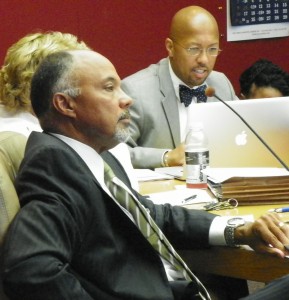By Diane Bukowski
December 23, 2011
Detroit—“A consent agreement consents to the takeaway, the giveaway of Detroit,” City Councilwoman JoAnn Watson said during a public hearing Dec. 1. “It has a trigger that says if you don’t pay your bills on time, or numerous other situations, you end up on a slippery slope to an emergency manager (EM) within seconds. There is nothing to be gained from giving away our city, we don’t have that right.”
Loud applause greeted her remarks, made in response to City Council President Pro Tem Gary Brown’s advocacy of such an agreement.
“A consent agreement gives you tools so you can address the problem without an emergency manager,” Brown said during the hearing. “It maintains the democratic process because City Council and the mayor would still be making the decisions.”
He alleged that the Mayor and Council would have the powers of an EM, including breaking union contracts. Michigan Gov. Rick Snyder and the city’s dailies have taken the same position.
Brown was the sole Council member not to sign a Dec. 15 letter to Gov. Rick Snyder authored by U.S. Congressmen John Conyers, Hansen Clarke, and Gary Peters and signed by 63 local and state elected officials. The letter requested a meeting with Snyder before further action under PA 4 was taken.
Snyder cavalierly ignored the request. He has now moved to the second step of a PA 4 takeover, appointing a team to conduct a 60-day review of Detroit’s finances, which may take less time if Snyder so orders, under provisions of PA 4, He ordered the Flint review team to cut the time in half to 30 days.
Despite Brown’s allegations, Public Act 4 does not give local officials the right to break contracts under a consent agreement. The act specifically exempts their ability to “reject, modify, or terminate 1 or more terms and conditions of an existing collective bargaining agreement” under Sec. 19 1(k). It reserves that power for the state alone.
It also gives the State Treasurer sole discretion to help draft and approve a financial “recovery plan” as part of the consent agreement, and sole discretion to terminate the agreement and move to an EM at any time.
“A consent agreement shall provide that in the event of a material uncured breach of the consent agreement, the state treasurer is authorized to place the local government in receivership as provided under section 15,” PA 4 reads.
The Detroit Board of Education, under then President Carla Scott, approved such a consent agreement under PA 4’s predecessor Public Act 72 in September of 2008. Only four months later, on Dec. 8, State Schools Superintendent Mike Flanagan terminated the agreement, and recommended an emergency financial manager. Governor Granholm appointed Robert Bobb shortly thereafter.
This was despite the fact that on Dec. 1, 2008, as part of a “deficit elimination plan” required under the consent agreement, the Board agreed to close an additional 63 schools, eliminate 16,000 jobs, outsource numerous departments, regionalize other services, get $37 million in union concessions, and charge for textbooks.
“The District has been in deficit for multiple years over the course of several decades,” Flanagan told Scott in his Dec. 8 letter. “During that time, the Michigan Department of Education’s interactions with the District have exposed numerous systemic issues including the failure to meet deadlines and requirements, the misappropriation and lapsing of significant amounts of federal dollars, and an inability to remedy its financial problems by taking appropriate action.”
Flanagan completely ignored the fact that for five of the eight years the state cited in the schools’ budget history, from 2000 through 2005, the district was under state control, as a result of then Gov. John Engler’s hotly-contested 1999 takeover. The district had a $93 million surplus in 1999, and ended up with a deficit of over $300 million by the time that first takeover concluded.
The deficit was caused by rampant borrowing encouraged by bank representatives who came to monthly meetings with the state trustee. These included a $220 million loan to be paid back over 15 years and taken out of the schools’ state per-pupil funding. Detroiters voted overwhelmingly to cancel that debt. Nearly 90 percent of state per-pupil funding now is reserved to pay off the district’s debt.
The district is a shell of its former self, and the state legislature is fast-tracking passage of bills that would eliminate any cap on charter schools, which will devastate public school systems state-wide because charters get funds originally allotted to public schools.
The state is currently lobbying Mayor Bing and the Detroit City Council hard for their approval of a consent agreement, which PA 4 requires.
Treasurer Dillon told reporters in a conference call Dec. 2, “I talked to the mayor today, and I talked to three of the city council members and there was a very positive tone of cooperation. So I think – well several council members have said publicly they would like a consent agreement, so I expect that we will work in cooperation with them and I told the mayor that we will coordinate with you so that we don’t interfere with the work that you have on your plate already.”











